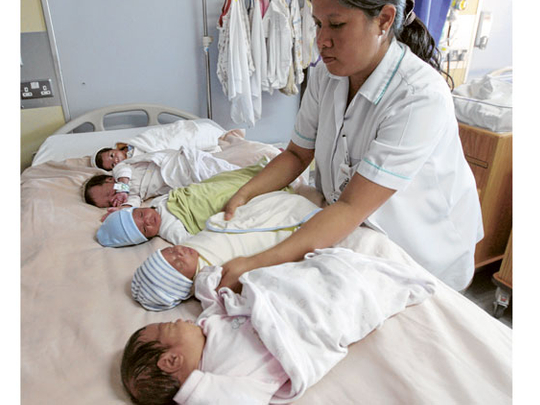
Abu Dhabi: The last thing that a poor Egyptian couple was expecting to handle was not one, two or three, but six newborns.
Sayed Mohammad, 37, and Soraya Foully, 32, were initially relieved to hear that Soraya was finally pregnant after 12 years of trying, and with the help of a hormone injection therapy — which helps hyper-stimulate the ovulation process, thus increasing chances of fertilisation.
The couple's excitement was short-lived however, after a doctor told Soraya that she was carrying sextuplets.
Mohammad who earns Dh2,000 from working as a driver, became concerned with the financial burden ahead of him.
After being separated by distance during 13 years of their marriage, Mohammad decided to bring his wife from Egypt, to live with him in Abu Dhabi. The family lived in an old one bedroom apartment with a shared bathroom on Airport road for almost one and a half years. Both Mohammad and Soraya lived on Dh500 a month, since Dh1, 500 went on rent.
"We got tired of living away from one another due to my financial situation. We also felt that it would help us get kids faster. Shortly after our decision, we were told that our building will get knocked down, which forced us to leave about the same time we found out Soraya was pregnant with sextuplets."
Since her pregnancy, Soraya and her sextuplets who were all born prematurely at seven months, resided in the hospital, while Mohammad found refuge in various friends' homes.
Health insurance
"I have no idea how I will find an affordable flat for my wife and our six babies. I am not even allowed to give my children health insurance by law because I earn less than Dh5,000," said Mohammad.
Following a series of medical procedures at the Corniche Hospital, Soraya gave birth to the sextuplets on October 12th in the hospitals neo-natal intensive care unit. They are considered the first sextuplet's to be born in the capital city, and one of only a handful recorded in the region.
A team of 30 clinicians were involved in delivering all six babies — three boys (Mohammad, Ahmad, Khalifa) and three girls (Israa, Sara, Donia) — who are currently under continuous monitoring at the hospital, while post-delivery examinations are being conducted. The smallest baby, Sara weighs 800 grammes, and the biggest, Donia, weighs one kilogramme. When Gulf News visited the family in the hospital, there were only five of the babies. The sixth baby, Khalifa, was said to be recovering from abdominal surgery in another hospital.
The family did not say what sort of abdominal complications Khalifa had, but confirmed that he is in a stable condition and will be fine. "However his surgery will cost us a lot of money,," said the father. During the delivery, Soraya developed gestational diabetes, dehydration and bleeding.
Bed rest
"I was asked not to move or walk during the first three months of the pregnancy," she said.
Even though Soraya and her sextuplets are ready to go home, the hospital agreed to keep them in the hospital till they find their own accommodation. "My husband and I need at least Dh11, 000 a month to take care of the [sextuplets]. I'd like to return to Egypt, so that my family can help me with the [sextuplets], but cannot afford the plane tickets. When we were first told I was pregnant with sextuplets, the last thing we thought about was money; we were relieved that God responded to our prayers, and still are, but now we realise that we have a huge problem ahead of us," the mother said.
Procedure: Hormone treatment
Hormone injection therapy requires careful medical supervision and should only be done by an infertility specialist who is experienced and trained in the use of follicle-stimulating hormone (FSH), which is a hormone which travels from the pituitary gland to the ovary, telling the ovary to grow and mature eggs each month.
It is the most powerful and reliable treatment for patients with ovulation disorders. Pregnancy rates of up to 15 to 20 per cent per treatment cycle can be expected. The overall pregnancy rate for patients who need and use this treatment is between 60-70 per cent per patient.
Multiple gestation: High risk and rare
Dr Judy Lee, Chief Medical Officer of Corniche Hospital, while speaking to Gulf News about the sextuplets, says: "These babies fall under the category of higher order multiple gestation, which carry a high risk and are rare. These babies required a highly specialised neonatal intensive care unit, which was provided for them at the hospital." In a general statement, Dr Lee called the procedure "the most complicated and rare of deliveries." She added: "All six of the children are said to be in a stable condition, and without any observable birth defects. The mother is back on her [feet] and with her husband."












